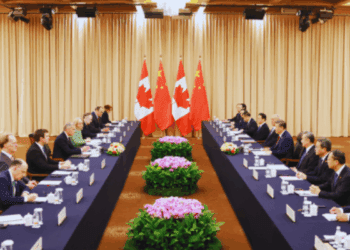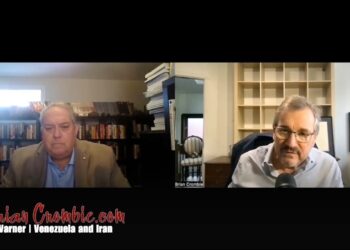This article originally appeared in Eye on the Arctic.
By Heather Exner-Pirot, May 11, 2023
Today the Arctic Council, the main regional forum of the eight Arctic states, transferred its Chairmanship from Russia to Norway. The question of what the Council should look like going forward, in the aftermath of Russia’s illegal invasion of Ukraine, remains unsettled. Russia, after all, has half of the Arctic’s territory, two-thirds of its people and three-quarters of its GDP. What it is the point of a regional organization that excludes it?
The better question to ask is what is the point of an Arctic Council that includes Russia. The organization that was established in Ottawa in 1996 no longer exists; Russia broke it. If it cannot adapt it will fail. The Arctic Council has spent a year in purgatory. The time to create something new has come.
The Arctic enjoyed an era of exceptionalism from the mid-1990s until 2022. During this time Arctic cooperation was compartmentalized from the great power politics that marked relations with Russia elsewhere. This was most pronounced after the Russian invasion of Georgia in 2008 and Crimea in 2014. While rebukes and sanctions followed, the Arctic Council was able to continue its work unabated.
In fact the period after the Crimean invasion was particularly fruitful for Arctic relations, with the establishment of an Arctic Coast Guard Forum to better coordinate search and rescue and other constabulary duties; a Polar Code to govern Arctic shipping; and an agreement on a moratorium on fishing in the Central Arctic Ocean.
Why was the Arctic deemed special – an exception – in international relations? As with the International Space Station, it was a conscious decision that recognized that our interests in the region were better protected by working with Russia than against it. Those interests revolved around pursuing a rules-based order that could support economic growth, protecting the Arctic environment, advancing Arctic science, and respecting Indigenous rights.
The Arctic Council also became a tight-knit place for the diplomats and scientists in its sphere. Often described as having a “family” like atmosphere, European, North American, Russian and Indigenous diplomats knew each other personally, travelled to small and remote places together, and worked on virtuous initiatives.
Russia’s war in Ukraine changed all that. The Arctic Council’s activities were immediately paused after the war. Scientific projects that didn’t include Russia were resumed last June, but it was still a shadow of its former self. The common refrain was that it was “no longer business as usual”.
The transition to the Norwegian Chairmanship has provoked optimism of the Arctic Council getting back to normal. As the joint statement issued today by all eight Arctic states – yes, including Russia – and the six Indigenous Permanent Participants proclaimed, there is a “commitment to safeguard and strengthen the Arctic Council.” The Norwegians have asserted that their top goal as Chair is to ensure that the Arctic Council “survives”. On paper, it is business as usual.
Outside the Arctic Council, all hell has broken loose. The west has put tremendous resources into defeating Russia in Ukraine, with the USA alone committing $37 billion in military assistance. Finland is building a wall on its border with Russia, and has officially joined NATO. Sweden is in the process of doing the same.
Vladmir Putin has a warrant out for his arrest by the International Criminal Court for war crimes against Ukraine, and there are allegations of genocide. Canadian Foreign Minister Mélanie Joly told the UN General Assembly in February that “Through its words and its actions, Russia is showing us very plainly that it does not respect this assembly and the members represented here.” It is impossible to square this with calls to maintain Russian participation in the Arctic Council.
But there is a reluctance, even a fear, to talk about what comes next. The default position has been to wait it out – to leave the door ajar and hope things smooth over sooner rather than later. It would be hasty to throw out what has taken decades to build, it is argued. The issues it is tackling, on Arctic science and climate change and Indigenous peoples, are too important.
But that is a false choice. If one assumes that relations between the West and Russia will not normalize for at least a few years – and how can it? – then at some point, the Arctic Council will turn into an A7. At any rate, there is no longer an A8.
Is an Arctic Council without Russia preferable? Absolutely not. But that is a choice that Russia has made, and that the other members have to live with. Better to adapt into something that can still advance its mandate of environmental protection and sustainable development in the Arctic, than remain frozen by nostalgia for a happier era.
Heather Exner-Pirot is director of energy, natural resources and environment at the Macdonald-Laurier Institute.





